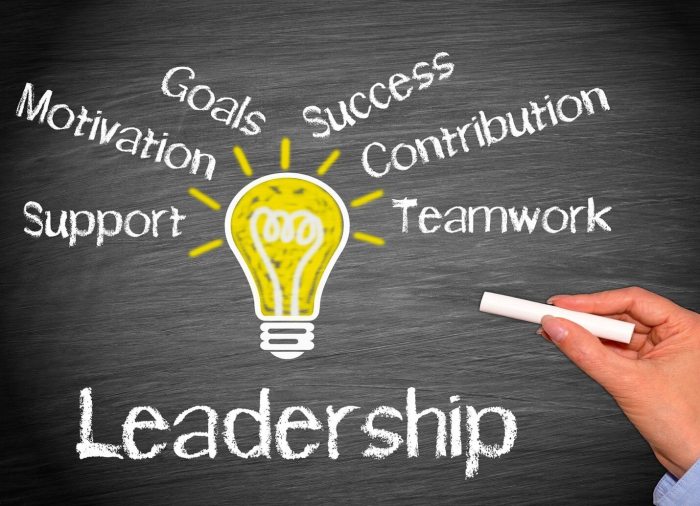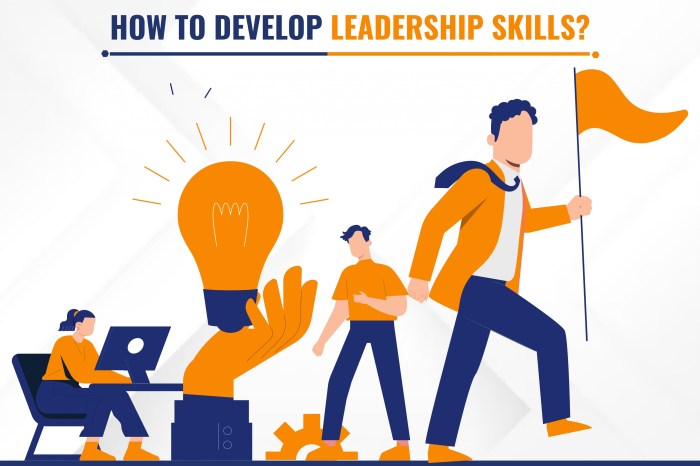Developing Leadership Skills at the forefront sets the stage for a journey filled with growth, empowerment, and success. Get ready to explore the key to unlocking your full potential in both your personal and professional life.
Importance of Developing Leadership Skills

In today’s fast-paced world, developing leadership skills is crucial for both personal and professional growth. Strong leadership abilities can make a significant impact on teams and organizations, driving innovation and fostering growth.
Enhancing Team Performance
Effective leadership skills can greatly enhance team performance by providing clear direction, motivating team members, and fostering a sense of collaboration. When a leader can effectively communicate goals and expectations, teams are more likely to work cohesively towards achieving success.
- Leaders who possess strong communication skills can ensure that everyone on the team is on the same page, reducing misunderstandings and increasing productivity.
- Effective leaders also know how to delegate tasks appropriately, playing to the strengths of each team member and maximizing efficiency.
- By inspiring and motivating team members, leaders can create a positive work environment that encourages creativity and innovation.
Driving Innovation and Growth
Leadership skills play a vital role in driving innovation within organizations. A strong leader can inspire creativity, encourage risk-taking, and foster a culture of continuous improvement. This, in turn, can lead to increased productivity, competitiveness, and overall growth.
- Leaders who are open to new ideas and willing to take calculated risks can spur innovation and push the boundaries of what is possible.
- By encouraging a culture of learning and development, leaders can empower their teams to seek out new solutions and approaches to challenges.
- Strong leadership can also help organizations adapt to change and navigate uncertain times, ensuring they remain agile and resilient in the face of challenges.
Key Leadership Skills to Develop: Developing Leadership Skills

Developing key leadership skills is essential for becoming an effective leader. These skills include communication, decision-making, adaptability, and emotional intelligence. Each of these skills plays a crucial role in leading a team and achieving success.
Communication
Effective communication is vital for leaders to convey their vision, goals, and expectations clearly to their team members. It involves active listening, articulating ideas, providing feedback, and resolving conflicts. To improve communication skills, leaders can participate in public speaking courses, workshops, and practice active listening during team meetings.
Decision-making
Leaders must make timely and informed decisions to steer their team in the right direction. Decision-making skills involve analyzing information, weighing options, considering potential outcomes, and taking decisive action. Leaders can enhance their decision-making abilities by seeking mentorship, gathering feedback from team members, and learning from past decisions.
Adaptability
In today’s fast-paced and ever-changing work environment, leaders must be adaptable and flexible to navigate challenges and seize opportunities. Adaptability involves embracing change, adjusting strategies, and leading by example during uncertain times. Leaders can develop adaptability by staying informed about industry trends, seeking feedback from stakeholders, and being open to new ideas.
Emotional Intelligence
Emotional intelligence is essential for leaders to understand and manage their own emotions and those of their team members. It involves empathy, self-awareness, social skills, and conflict resolution. Leaders can enhance their emotional intelligence by practicing mindfulness, seeking feedback from peers, and engaging in emotional intelligence training programs.
Methods for Developing Leadership Skills
Developing leadership skills can be achieved through various methods that help individuals enhance their abilities to lead effectively. By utilizing approaches like mentoring, coaching, workshops, and online courses, individuals can work on improving their leadership qualities and becoming more successful in leading teams and organizations.
Mentoring
Mentoring involves a more experienced individual guiding and supporting a less experienced person in their professional development. This method allows for personalized guidance and feedback, helping individuals develop their leadership skills through real-life experiences and advice from someone who has been in a similar position.
Coaching
Coaching focuses on setting specific goals and objectives to help individuals reach their full potential as leaders. Coaches provide support, encouragement, and constructive feedback to help individuals overcome challenges, improve their decision-making skills, and enhance their overall leadership capabilities.
Workshops
Workshops offer a structured environment for individuals to learn and practice different leadership techniques. Through interactive activities, group discussions, and role-playing exercises, participants can develop essential leadership skills such as communication, problem-solving, and decision-making in a hands-on setting.
Online Courses
Online courses provide a flexible and convenient way for individuals to access leadership training and development resources. These courses cover a wide range of topics related to leadership, including emotional intelligence, conflict resolution, and team management, allowing individuals to learn at their own pace and apply new skills in their professional lives.
Setting Goals and Creating a Personalized Development Plan, Developing Leadership Skills
To enhance leadership skills effectively, individuals should set specific and achievable goals for their personal growth. By creating a personalized development plan that Artikels steps, timelines, and resources needed to reach these goals, individuals can track their progress and make adjustments as needed to continue their leadership development journey.
Significance of Feedback and Self-Reflection
Feedback from mentors, coaches, peers, and team members plays a crucial role in improving leadership skills. By actively seeking feedback and reflecting on their actions and decisions, individuals can identify areas for improvement, build self-awareness, and make necessary changes to become better leaders.
Challenges in Developing Leadership Skills
Developing leadership skills can be a challenging journey filled with obstacles that can hinder growth and progress. It is essential to identify these challenges and implement strategies to overcome them in order to become a successful leader.
Time Management
One common challenge individuals face when developing leadership skills is managing their time effectively. Balancing work, personal life, and skill development can be overwhelming, leading to burnout and lack of progress.
- Utilize time management tools such as calendars and to-do lists to prioritize tasks.
- Delegate tasks to team members to free up time for skill development.
- Set specific time blocks dedicated to leadership skill practice and improvement.
Communication Skills
Another obstacle in developing leadership skills is poor communication. Effective communication is crucial for leading a team and building relationships, but many struggle with articulating thoughts and ideas clearly.
- Practice active listening to understand others’ perspectives and improve empathy.
- Participate in public speaking classes or workshops to enhance communication skills.
- Solicit feedback from colleagues and mentors to identify areas for improvement.
Resilience and Perseverance
One of the most important challenges in developing leadership skills is the need for resilience and perseverance. Leadership development is a continuous process that requires dedication and the ability to bounce back from setbacks.
- Cultivate a growth mindset to view challenges as opportunities for growth and learning.
- Seek support from mentors or coaches to navigate difficult situations and stay motivated.
- Celebrate small victories along the way to maintain motivation and momentum.